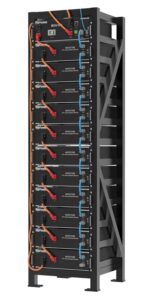⚠️ The Growing Risk in the Digital Solar Era
As solar energy systems become more technologically advanced, the risk of cyberattacks increases. Today’s solar installations—especially for homes, businesses, and mini-grids—often include:
- Smart inverters that communicate with the utility grid.
- IoT devices for performance monitoring and remote control.
- Cloud-connected apps and web portals for real-time data tracking.
- Battery storage systems with digital controls.
While these innovations increase efficiency and user experience, they also open up new cyber vulnerabilities that didn’t exist in older, analog systems.
🛑 Fact: A compromised smart inverter can allow hackers to shut down a solar system or manipulate energy flows—impacting the entire grid if the system is grid-tied.
🕵️♂️ Real-World Examples of Solar Cyber Threats
- Tesla Powerwall units were once proven vulnerable to remote hijacking during a security demonstration.
- In 2022, hackers in Europe targeted solar companies to try and disrupt power distribution during geopolitical tensions.
- Large-scale solar farms have become attractive targets for ransomware, where attackers demand money in exchange for restoring access to operational controls.
🌍 Cybersecurity in the African Context
In Africa, where solar is playing a critical role in energy access and decentralized power generation, the urgency for cybersecurity is increasing:
- Mini-grids, if compromised, could cut power to entire rural communities.
- Industrial installations tied to factories or data centers are now cyber-critical infrastructure.
- Yet, cybersecurity awareness in the solar industry remains low.
🎯 Jeho Ashar Energy’s Advantage: Securing the Future
✅ 1. Proactive Cybersecurity Integration
Jeho Ashar Energy can position itself as one of the first African solar providers to prioritize cybersecurity by:
- Partnering with cybersecurity experts to vet all smart hardware and software solutions.
- Ensuring that firmware and app software are regularly updated.
- Installing secure, encrypted communication channels between components (e.g., inverter to app/cloud).
🔐 Result: Clients feel safer knowing their solar systems are as secure as their data.
✅ 2. Client-Focused Cyber Training and Support
Educating clients is just as critical as securing hardware. Jeho Ashar can:
- Provide simple cybersecurity guides for residential and business users.
- Train users on safe password management, remote access protocols, and two-factor authentication for their apps.
- Offer 24/7 support for digital or app-related system errors—reducing risk from poor user handling.
📘 Value-added service: Builds customer trust and loyalty while minimizing post-installation issues.
✅ 3. Secure Installations for High-Risk Clients
Some clients—banks, government offices, hospitals—are more vulnerable to targeted attacks. Jeho Ashar can:
- Offer a “Secure Solar Tier” package specifically for high-security environments.
- Conduct cyber audits as part of system installations.
- Implement local storage failovers for critical loads (ensuring power remains even if the cloud is compromised).
🧩 Edge: Most solar providers install the system and leave. Jeho Ashar supports it for its full digital lifecycle.
✅ 4. Building Cyber Compliance into Contracts
Jeho Ashar can include cybersecurity clauses in its contracts and proposals:
- Compliance with local data protection regulations.
- Guidelines for remote monitoring platform security.
- Offer warranty extensions or service upgrades for customers who adopt recommended security features.
💼 Impact: Builds reputation with institutions and corporate clients who require data and system protection.
🧭 Business and Branding Benefits
- Thought Leadership: Jeho Ashar can lead conversations on cyber-safe solar installations in Africa—a rare but rising topic.
- Premium Client Attraction: Corporate and government clients will prefer providers with integrated cybersecurity.
- Reduced Legal Risk: Avoid lawsuits or PR disasters tied to system hacks.
- Customer Confidence: Modern customers want digital convenience without security compromise.
📌 Final Thought
Smart solar systems are part of the critical digital infrastructure now. But without cybersecurity, they become ticking time bombs. Jeho Ashar Energy has a powerful opportunity to pioneer cyber-safe solar solutions in West Africa, combining clean energy with digital trust.




